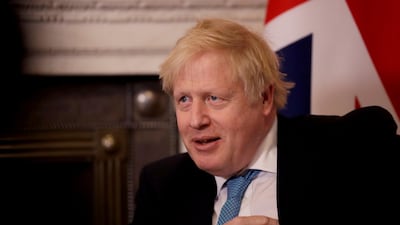British Prime Minister Boris Johnson on Tuesday announced government plans to produce a broad review of the country’s foreign policy, defence and international development objectives.
Mr Johnson's office said the review would cover “all aspects of the UK’s place in the world", from the role of its diplomatic service to defence procurement and the capabilities of its intelligence services.
The UK government said the review was the largest to be undertaken since the end of the Cold War.
Announcing the overhaul, Mr Johnson said the government “will be judged by how we respond to the opportunities ahead".
“As the world changes, we must move with it, harnessing new technologies and ways of thinking to ensure British foreign policy is rooted firmly in our national interests, now and in the decades ahead,” he said.
The report would seek “new and innovative ways to promote our interests overseas while continuing to commit 2 per cent of GDP to defence and 0.7 per cent of GNI [gross national income] to international development".
Mr Johnson said the UK government “must do more to adapt" as it negotiated trade agreements with its largest partners after Britain’s departure from the EU.
The deputy director general of the UK’s Royal United Services Institute, Malcolm Chalmers, said the review’s “increased focus on foreign policy” could make it the most radical since the Cold War.
“In contrast to previous reviews, the previous commitment to ‘support for the rules-based international system’ is noticeably absent from this statement,” he said.
“A radical review of foreign policy is needed to help the government respond to US President Donald Trump’s ‘America First’ doctrine which, together with wider international trends, is in danger of leaving the UK isolated when pursuing its national interests.”
But he said that while there were opportunities for the UK as a result of changing international circumstances, “the risks to the UK's essential alliance relationships are greater now than they have been for many decades”.
Government departments are due to contribute to the review, including the Ministry of Defence, the Department for International Development and the Home Office.
The government said it would call on the help of experts from within and outside its ranks to conduct the review, which would run parallel to a broad spending review.
Both are due to conclude at the same time and the government said decisions on any recommendations would be made by the National Security Council, headed by Mr Johnson.


